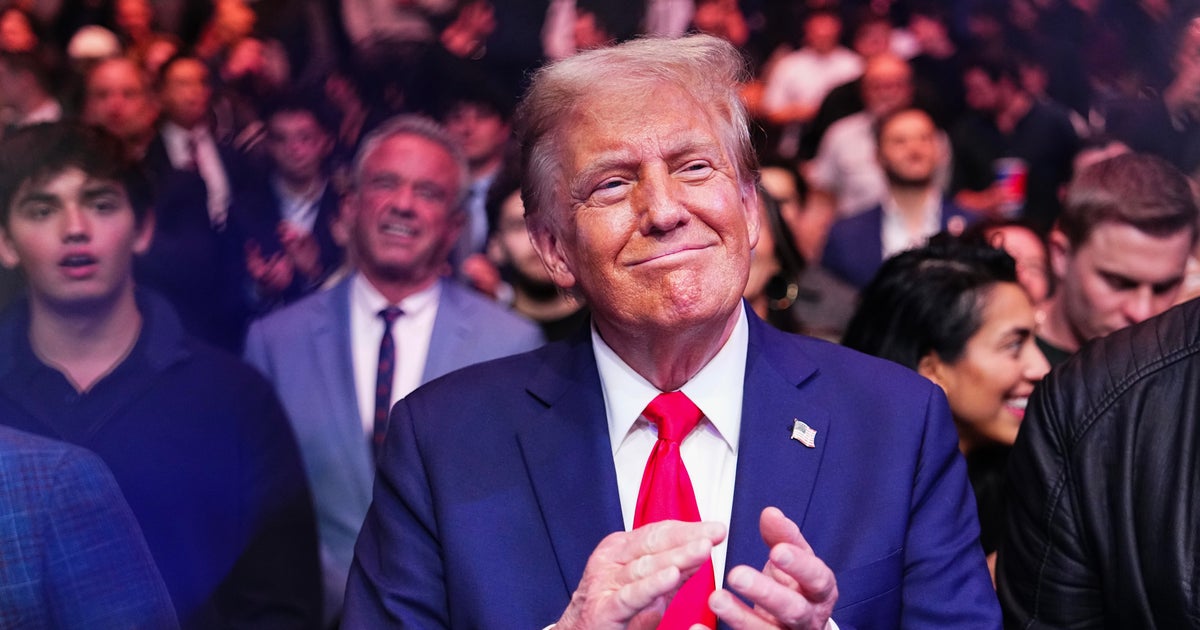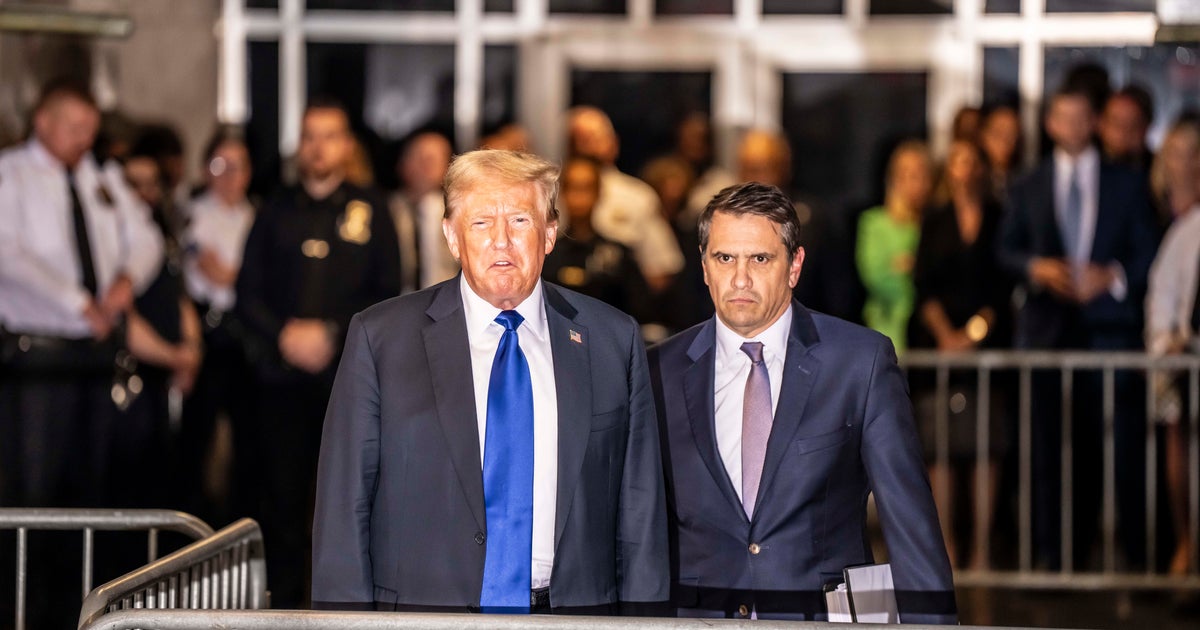Virus outbreak reshapes presidential race in Sun Belt — CBS News Battleground Tracker poll
The coronavirus outbreak is reshaping the presidential race in three key Sun Belt states. Joe Biden is now leading President Trump by six points in Florida, and the two are tied in Arizona and competitive in Texas, where Biden is down by just a point to Mr. Trump. Biden has made gains in part because most say their state's efforts to contain the virus are going badly — and the more concerned voters are about risks from the outbreak, the more likely they are to support Biden.
In all three states, most voters say their state reopened too soon, and those who say this feel their state went too fast under pressure from the Trump administration. Most also say the president is doing a bad job handling the outbreak. He may be paying a price for that, at least in the short term.
This is helping Biden not only to post bigger gains with groups that already trend Democratic — like women and younger voters — but also to cut into Mr. Trump's margins with seniors. Seniors who are very concerned about coronavirus back Biden in large numbers.
Though embattled in three states he won in 2016, the president remains bolstered by enthusiastic support from his base; by the belief that his policies are a little more likely to help the economy recover than hinder it; and by the fact that the economy still outranks coronavirus as a top issue, in part because Republicans express much less concern about the virus, while both parties agree on the importance of the economy.
Here's the breakdown.
The virus and the vote
Three in four voters view the coronavirus outbreak in their state as a very serious problem, if not a crisis. A majority of voters think efforts to deal with the outbreak of coronavirus in these states is going badly.
In these three states, roughly six in 10 think their state moved too quickly in reopening the economy and lifting stay-at-home restrictions, and most of those feel that was due to pressure from the Trump administration, not because the state thought it was the right thing to do.
Those with the most negative assessments of their state's handling of COVID-19 and those most concerned about contracting it themselves are more likely to be voting for Biden.
Some of this stems from partisanship, since Democrats are more concerned about coronavirus in general, though the pattern also holds among independents and moderates across these states.
Nine in 10 Biden backers cite the coronavirus outbreak as a major factor in their vote, more so than the economy.
Biden also has an edge in the perception that he cares about the virus risk, which has particular resonance among those most concerned about getting it. More voters say Biden cares about their risk of contracting the virus than say Mr. Trump does.
The economy and the vote
For Republicans, though, the outbreak is both less of a crisis, and less of a personal concern.
Republicans and Trump voters in these states don't think the outbreak rises to the level of a crisis — they're three times less likely than Democrats to call it one — but rather tend to describe it as a serious problem. Most say efforts to contain the outbreak in their state are going at least somewhat well, and most don't say their state reopened too quickly.
Voters backing Mr. Trump in these states cite the economy as a major factor in their vote, far ahead of the coronavirus.
Mr. Trump is seen as caring more about voters' economic situation than their virus risk. Republicans, who say the economy is a major factor in their vote, especially say Mr. Trump cares about their economic situation. Most Republicans say his policies are helping the economy recover and say that Biden's policies would make the economy worse.
Aside from the economy, Trump supporters cite the recent protests as another major factor in their vote — more often than they cite the coronavirus. And unlike voters overall, most Trump voters say they disagree with the ideas expressed by the Black Lives Matter movement.
Across these states, there is a division on what should happen to Confederate statues and symbols in public places. A majority of Republicans and most Trump supporters, along with independents, think they should remain. Most Democrats and Biden backers think the statues and symbols should be removed.
A closer look at the horserace
The former vice president has a six-point edge in Florida. Mr. Trump has a one-point edge in Texas and they are tied in Arizona.
Currently, all three states appear competitive because Biden has expanded his support among demographic groups that backed Hillary Clinton in 2016.
In each state, Biden is doing better with women than Clinton did four years ago. In Florida, in particular, Biden leads among women by double-digits; Clinton won women in Florida by four points. Biden has narrowed the gap with white women, in particular, though Mr. Trump still has the advantage. This is boosted by strong support for Biden among white women with a college degree, a group Clinton lost in Florida.
Biden is also making some inroads with seniors, who have voted Republican in stronger numbers in these states in recent years, and could be crucial in Florida. There, Mr. Trump currently has an 8-point lead among seniors, but that's just half of his margin among them four years ago.
Biden leads among Hispanic voters in all three states. He is currently getting the support of about six in 10 Hispanics in Texas and Florida, similar to the vote share Clinton received in 2016. In Arizona, seven in 10 Hispanic voters back Biden, a bit higher than Clinton's share.
Mr. Trump is leading among men in each of these states — albeit by smaller margins than in 2016 — and continues to get strong support from white voters without a college degree, who made up a big part of his winning coalition four years ago. White evangelicals continue to back Mr. Trump by large margins.
In all three states, more Trump supporters express enthusiasm about voting than Biden supporters do, although it is not a large gap.
An important difference emerges in the main reason each candidate's supporters give for their vote. When asked whether their choice was mainly because they liked their own candidate or to oppose the other candidate, two-thirds of Trump's backers said it was because they like him (not just to oppose Biden). Among Biden voters, on the other hand, opposing Mr. Trump is the top reason selected.
Room for movement? Can things change?
In these states, large majorities intending to vote for either candidate say their minds are made up — they say they have decided or probably won't change their minds.
And few of these candidates' supporters say they would consider backing the other candidate. In these states, nine in 10 Trump voters say they would never vote for Biden, and a similar number of Biden voters say they would never vote for Mr. Trump.
It's among those who are currently not sure who they are voting for — or are currently backing someone other than Biden or Mr. Trump — where the major candidates may have a better chance of picking up support. In Texas, more of these voters report having voted for Mr. Trump over Clinton in 2016, perhaps an indication that they could move toward the president.
And then, of course, there's the turnout factor. It's only July, but amid the pandemic, this election may come down to the ability to cast ballots.
More voters in these three states would like to see voting by mail made easier than harder. Most Democrats and Biden voters, along with a plurality of independents, would like their states to make it easier to vote by mail, and many would prefer to vote that way themselves. Republicans and Trump voters prefer their state not change the way it handles mail-in voting.
These surveys were conducted on behalf of CBS News by YouGov between July 7-10, 2020. They are based on representative samples of 1,099 registered voters in Arizona, 1,229 in Florida and 1,212 in Texas. Margins of error for registered voters: Arizona +/- 3.8 points, Florida +/- 3.5 points, Texas +/- 3.3 points.
Toplines




















